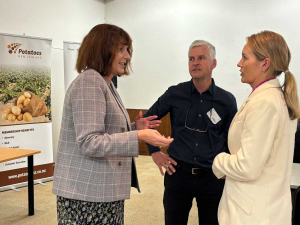ACC backs young farmers with FMG Young Farmer of the Year partnership
The Government has announced that ACC will be a sponsor of this year's FMG Young Farmer of the Year competition.
 Potatoes NZ chief executive Kate Trufitt, SVS programme manager, Andrew Barber, and Horticulture Minister Nicola Grigg.
Potatoes NZ chief executive Kate Trufitt, SVS programme manager, Andrew Barber, and Horticulture Minister Nicola Grigg.
In a ceremony held last week at Plant & Food Research in Lincoln, Horticulture Minister Nicola Grigg launched the Sustainable Vegetable Systems (SVS) Tool.
SVS is a nitrogen budgeting tool developed in conjunction with agricultural experts, environmental scientists and industry partners.
“It was wonderful to officially launch the SVS tool and celebrate the hard work of many through the development of this technology,” Grigg says.
“I see the opportunities and benefits of this tool as a remarkable example of what may be achieved through collaboration, innovation and science," she adds.
The tool aims to provide growers with comprehensive evidence-based decision support to optimise their nitrogen management practices.
The project to develop the tool began in 2019, coming out of a scarcity of data surrounding vegetable nitrogen flows, particularly in crop rotation systems, as well as a need to sustainably support growers.
Over the course of three years, nitrogen flow data rates using varieties of fertiliser were measured using a selection of representative vegetable crop rotations at Plant & Food Research sites in Lincoln and Hawke’s Bay.
These experiments were reproduced regionally across New Zealand with increasing engagement with growers to provide insights into vegetable nitrogen optimisation.
SVS programme manager, Andrew Barber, says the tool integrates nitrogen planning with soil testing, progressively overriding modelled predictions with measured results.
“The real time data and personalised guidance will help make more informed decisions, ultimately improving performance and reducing environmental impact,” he says.
The project consolidated data from various sources and stakeholders with key inputs from Plant & Food Research modellers, plant and soil scientists.
Miriam Hall, Plant & Food Research business manager of the programme says the tool is “world leading”.
“Creating data-based modelling tools from collaboration with a variety of stakeholders is critical to support growers,” Hall says.
“Plant & Food Research are proud of being part of this project to help shape the New Zealand vegetable industry to a sustainable future,” she adds.
Meanwhile Kate Trufitt, chief executive of Potatoes New Zealand says the SVS tool represents a “significant advancement” in the sector’s efforts to promote sustainable farming practices.
“By equipping our growers with cutting-edge technology and actionable insights, we are taking a major step towards a more sustainable and resilient agricultural future,” she concludes.
The Meat Industry Association of New Zealand (MIA) today announced that Chief Executive Officer Sirma Karapeeva has resigned from the role.
The winners of the 2026 Hawke’s Bay/Wairarapa Dairy Industry Awards were announced at the annual awards dinner held at Copthorne Solway Park in Masterton on Thursday evening.
Environment Southland is welcoming this week’s decision by the Environmental Protection Authority (EPA) to approve the release of Blaptea elguetai, a leaf‑feeding beetle that will help control the highly invasive Chilean flame creeper.
This March, the potato industry is proudly celebrating International Women’s Day on 8 March alongside the International Year of the Woman Farmer, recognising the vital role women play across every part of the sector — from paddocks and packhouses to research, leadership, and innovation.
Fruit trader Seeka posted a record profit and returns to shareholders in 2025.
Recent weather events in the Bay of Plenty, Gisborne/Tairawhiti, and Canterbury have been declared a medium-scale adverse event.

OPINION: A mate of yours truly reckons rural Manawatu families are the latest to suffer under what he calls the…
OPINION: If old Winston Peters thinks building trade relations with new nations, such as India, isn't a necessary investment in…